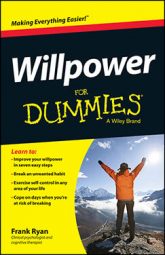Understanding your personality can help you make your willpower work for you. Recognising and accepting that you’re spontaneous and impulsive, for example, can help you anticipate when your willpower may be challenged. You can use your willpower to bypass going on a shopping spree, in order to save for an adventurous holiday. You thereby nurture your quest for excitement or stimulation in a way that’s ultimately more enriching than yet another trip to the shops.
Maximising your willpower is about improving your well-being – not about becoming a predictable and dreary robot! It’s less about self-denial, more about choosing when and where you can have fulfilling, pleasurable and enriching experiences.
Five dimensions, or relatively independent factors, define your personality and everyone else’s. Most people are in the middle zone rather than at the extremes, but the personalities at the far ends help define those in the middle. The Big Five can be combined to form the acronym OCEAN (or CANOE if you prefer!):
Openness: This refers to being open to new experiences. If you tend to seek out novel or diverse experiences, and you find routines dull and boring, you’re likely to be strong on this personality attribute. You may also be creative and independent, but occasionally impulsive.
Openness, like any of the Big Five, isn’t necessarily the best personality trait in all situations. If you’re high on this dimension, you may find yourself easily distracted. This can weaken willpower in some situations where a narrow, more down-to-earth approach is better. Following a complex recipe in the kitchen, for example, requires you to focus on the ingredients and quantities and on completing the steps in the right sequence. You can always be imaginative in your choice of wine!
Conscientiousness: If you’re strong on this dimension, you’re likely to be dependable, self-disciplined and achievement-orientated. You may be rather less spontaneous and find it unsettling if a plan is changed or comes undone. If you’re not strong on this dimension, you may be rather carefree and impulsive.
Extraversion: This is one of the better-known personality characteristics. Extraverts are sociable, assertive and outgoing. At the other end of the scale, introverts can be reserved and comfortable being alone.
Agreeableness: This personality characteristic reflects the degree to which someone is friendly and compassionate versus being more critical, tough-minded or unkind. Clearly, a disagreeable disposition can be problematic within a family or in the workplace, but being overly agreeable – saying yes when you should politely say no – can cause problems in due course.
Neuroticism: You may call this emotional sensitivity, because the adjective neurotic appears judgemental. Regardless of the term used, your own and others’ emotional responsiveness is clearly a definitive aspect of individuality and personality.
If you frequently experience feelings of sadness, anxiety or anger, perhaps on a daily basis, this probably reflects the influence of this personality characteristic. At the other extreme, lacking emotional sensitivity means that you may not be able to empathise with others or experience the full palette of emotions that enrich human experience.
No ideal personality profile exists for delivering a constant supply of willpower, but extremes on any dimension can cause problems.

